Eddie Jones once again agent of his own destruction
No fight, no spirit, no ingenuity; he has stripped Australia of their DNA. It took England too long to sack him, but the Wallabies will need to act sooner
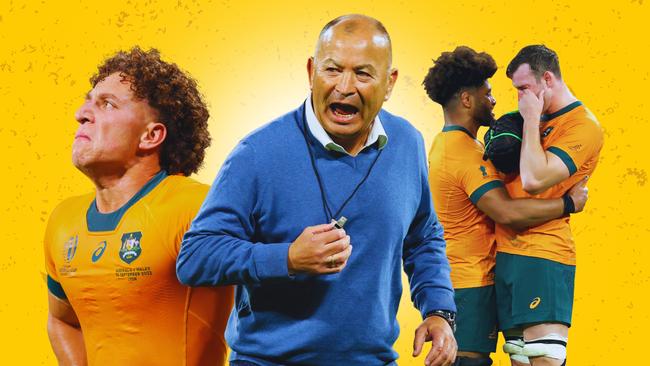
Post mortems usually take place when a team’s tournament is over. Australia still have a game to go at this World Cup, yet their post mortem started midway through the second half on Sunday night when Carter Gordon kicked a penalty dead, the camera flashed to a picture of Eddie Jones covering his face with his hands and the crowd booed him again.
If you didn’t know already that the Wallabies were dead and buried, here was your confirmation. Images of disaster. Self-belief had evaporated and the ability to execute had deserted them too.
Just as a briefing note, the Carter Gordon who fluffed that penalty was the 22-year-old who had been elevated to the pre-eminent position of Wallaby No 10 around whom Australia would rebuild their team, but who was suddenly substituted when he had struggled against Fiji seven days previously. Given that he was then dropped from the starting line-up for this Wales game and only came off the bench, it wasn’t the greatest surprise that a young man who had been so publicly unthroned might have some confidence issues and that this might affect his performance. But more on that later.
Within half an hour of the final whistle, a headline had appeared in the Sydney Morning Herald which declared that “The Eddie Jones experiment can officially be declared a disaster”. The Roar rugby website quickly roared back – “End this Eddie soap opera now”.
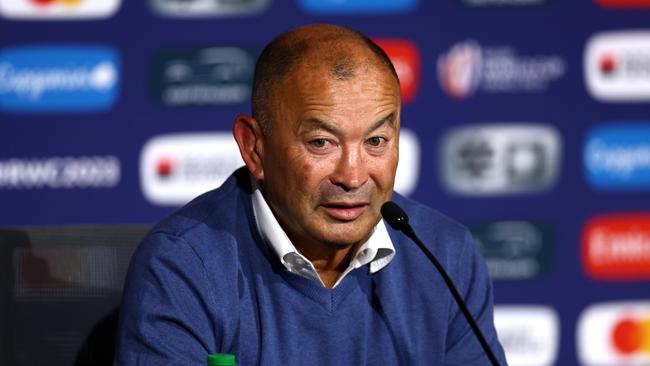
Ex-players and pundits were quickly throwing punches too. But you didn’t need David Campese or Sonny Bill Williams or Bernard Foley to start landing blows to know how messy this would become. As car crash campaigns go, this was one of the all-time smash-ups.
So much about this Australia defeat was historic: the scoreline, the Wallabies’ unprecedented likely early tournament exit, the very lack of what you’d call Wallaby DNA: fight, spirit, ingenuity. And of course it felt like a moment in history – or rugby history – because it had also developed into a referendum on Eddie Jones. Or a public trial. But certainly an open debate: how can he stay in the job? Do you think Eddie’s going to resign? To which the answer is: no, Eddie doesn’t resign. His modus operandi is to wait for the sacking, take the payout and only then walk into the next job.
Indeed, the next job may have already been lined up. This had been reported in the Sydney Morning Herald on the morning of the Wales game: that even though Jones is contracted to Australia for another four years, only a month ago he had been interviewing to take over the Japan job next year.
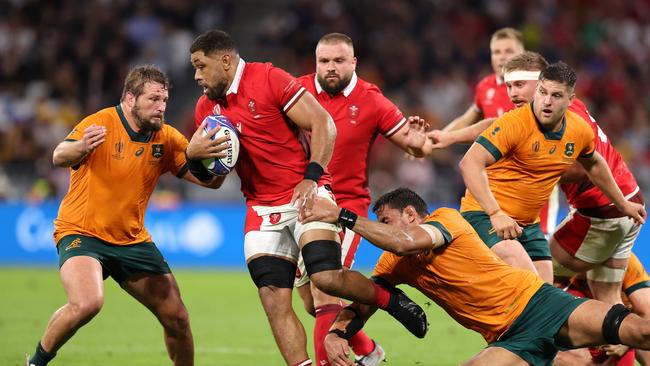
Everyone will have their own judgment on the lack of loyalty or integrity or decency involved here, but in the OL Stadium on Sunday night, as the Wallabies’ attempt to hang on to any World Cup future gradually crumbled, you wondered how the news had affected their psychology. How does it feel to be going into battle in a do-or-die game like this when you are reading that your coach has been looking at maybe securing his future by taking the back door elsewhere instead? These are the times when the players need to stick together. Here, they were discovering that their leader may be negotiating the next ship he can jump to.
Afterwards, when the players were asked how the Eddie stories had influenced their performance, they refused to use them as an excuse and fell back on the common response that it was just white nxoise. We may never know how accurate that was. All we know for sure is that they had just completed one of the most miserable 80 minutes of any Australia team. Probably the worst in Wallabies World Cup history.
Of course we knew that Australia could lose this game. But no one had foreseen a collapse of this kind. Not a humiliation.
All around rugby, it seems there is a temptation, here, to be dancing on graves. Not the Wallabies’ grave but Jones’s. It has become de rigueur for rugby audiences to boo him when his face appears on stadiums’ big screens. I wrote here just over a week ago that Jones was in danger of becoming a bit of a joke figure and unfortunately that is what has happened. He is like the game’s pantomime villain. And people are laughing at how crap his team have become.
And this might feel a very dramatic and very public debagging, but even though the Wallabies’ World Cup campaign has sometimes felt like Jones Incorporated – his story, his narrative, his triumphs, his defeats – the most poignant sight on Sunday night in Lyon was not Jones’s rearguard defence in the press conference room, or Jones with his head in his hands, it was the players on the pitch after the final whistle.
It was the heartbreaking body language. Nick Frost, the giant Wallaby lock, just stood frozen for minutes, refusing to make eye contact, a distant look in his face and what seemed like tears in his eyes. And that is just one description but it stands for pretty much every one of the squad who was coming to terms with the fact, not just that their World Cup was dead and buried, but that their dreams had come crashing down so ignominiously. If you are going out, you want to be able to say that you went down fighting, that’s got to be the minimum. But they didn’t hit minimum and their sad truth is that this doesn’t reflect who they are as people or competitors at all. It is where their campaign has left them.
It was just seven words, from Foley on X/Twitter, that summed it up: “It didn’t have to be like this.” Absolutely – it didn’t have to be like this at all.
It didn’t have to be like this !
— Bernard Foley 🇦🇺 (@bernardfoley) September 24, 2023
The 40-6 scoreline was in part a reflection of Wales. They were good. But so much of the Wallabies’ unravelling was self-inflicted. So many of Jones’s decisions have backfired. He has been very much the agent of their own destruction.
Just for instance, he never needed to put all that pressure on the newly anointed Gordon. And then, when Gordon failed, he had to promote another rookie, Ben Donaldson, into the No 10 shirt and was it really such a surprise that, in this new position with new systems and new partners either side of him, that Donaldson should make the smallest of judgment errors after Wales’s first lineout? That he went up slightly too quickly in defence so that he missed the inside pass and the tackle meaning that Jac Morgan was suddenly through and Wales were suddenly ahead? That’s 7-0 and you’re still in the third minute.
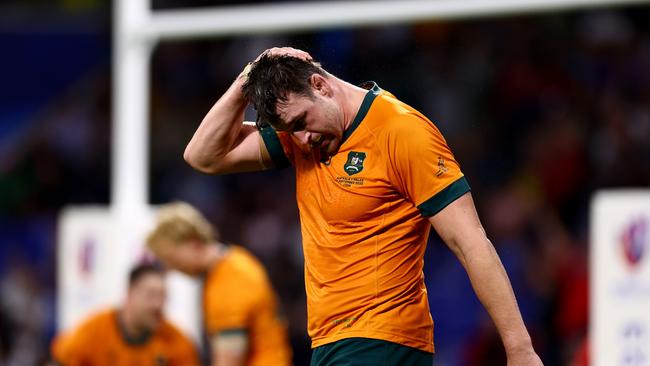
My match notes contained a catalogue of Donaldson errors. But you can’t blame him. What you can do is ask why he was put in that position in such a massive game? It was a preposterous gamble, yet the way Jones had played his hand, it was the only card he had left.
Selection is the most important job for a coach and Jones got it wrong again here. It is with a kind of Svengali certainty that he breaks with established thinking. No one has ever selected just one (or not even that) established international No 10 in their World Cup squad – and yet he thought that was a clever play here. It blew up in his face. It is little different to four years ago with England, when he gambled by bringing just two scrum halves and then had to fly out a third who arrived just in time for the final. That blew up too.
His task at this World Cup was to manage a squad’s transition from one generation to the next. This was exactly the same task confronted by Warren Gatland when he returned to rescue a plummeting Wales side – and Sunday’s scoreline shows who got it right.
Gatland saw off the end of some careers but kept a posse of older heads to help the new brigade bed in. You would call that textbook generational change management. Jones, however, thought he could do better than the textbook and in his entire squad selected only three players with 50 caps or more.
When Foley says that it didn’t have to be like this, he meant that when the going got tough, the squad had no one to look to. No experience to turn to. No leaders who had been here before. It didn’t have to be like that. They didn’t play, here, like their lives depended on it. But without players with been-there done-that experience, we can maybe understand better how his team dissolved in the heat of their do-or-die mission against Wales.

Again, this was self-imposed, just as it was self-imposed that Jones would come here with such an inexperienced coaching team. Coaches don’t particularly like working for Jones; at the time when he was being appointed, the best Wallabies coaches quickly deserted. So Australia fought a World Cup campaign with inexperienced players and inexperienced coaches and this is probably why they finished on a record-breaking defeat and with people asking questions like: how long is he going to stay? And what on earth were Rugby Australia thinking? And you see Frost et al with their hearts broken at the end of it and know that this was the World Cup experience that they will be living with forever.
Afterwards, we wondered how the press conference would play out. That’s another sad element of this Wallaby campaign: it has become almost as notorious for its head coach’s fireworks in the media as it has for his team’s performances. Yet here there was extra interest: not just whether he would turn nasty on his inquisition, or whether he might resign, but how he would deal with the questions about the Japan job.
On Japan, he set off by claiming complete ignorance: “I dunno what you are talking about, mate.” He then insisted that he was committed to the Wallabies but refused to say for how long. And he certainly didn’t deny that he’d had the interview with the Japanese rugby bosses.
Eventually he grew weary of it and said he took “umbrage” at the line of questioning which cast doubt on his commitment to the cause. So we went back to the Wallabies’ rugby instead.
“While it looks at the moment like it’s a shambles,” he said, “I can guarantee that it’s not.” But Jones has been guaranteeing a lot of things to a lot of people in the game and any faith that he might actually deliver is finally drying up.
It took England and the RFU too long to come to recognise how badly he had destabilised the national team. Maybe the Aussies will see it more clearly. It is quite something to have such a negative influence on not one World Cup campaign but two.
So no, no dancing on graves. Let’s just hope that the Wallabies improve quickly when their own post-Eddie era begins, and that Japan don’t follow suit and start another Eddie era of their own.

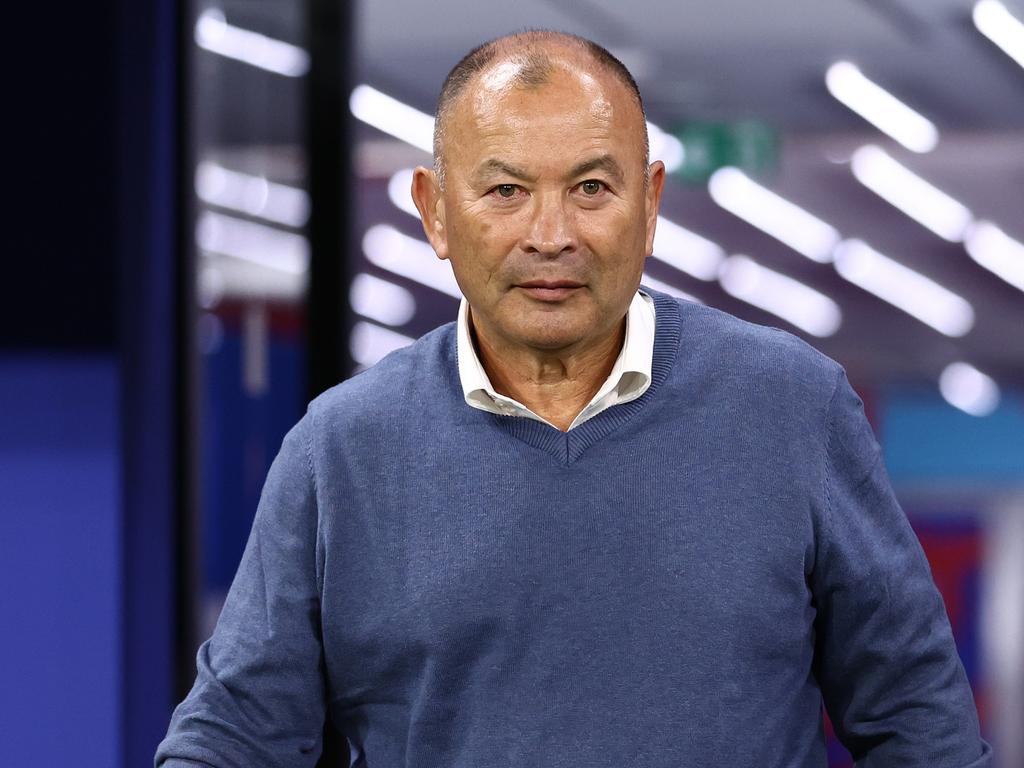



To join the conversation, please log in. Don't have an account? Register
Join the conversation, you are commenting as Logout